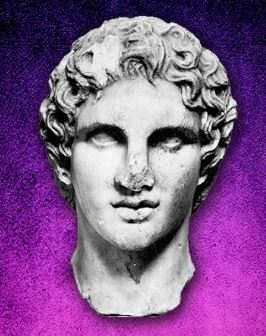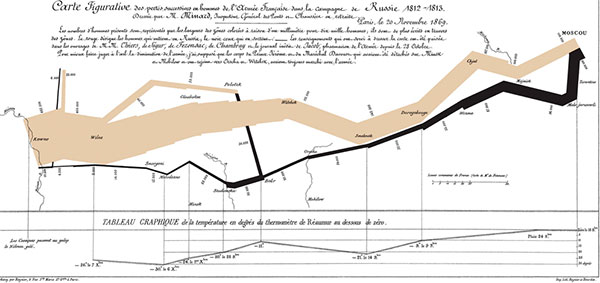Arrias on Politics

Napoleon Bonaparte, Bette Davis and the New President
By the time most read this the election will be over, a new president will have been elected, and everyone, particularly the media pundits, will be in full throat, telling us what happens next.
In that light, a little history to provide some context…

(Charles Joseph Minard, a French civil engineer, devised this chart to depict Napoleon’s progress to and from Moscow. A thick band illustrates the size of his army at specific geographic points during their advance and retreat. It displays six types of data in two dimensions: the number of Napoleon’s troops; the distance traveled; temperature; latitude and longitude; direction of travel; and location relative to specific dates).
On November 6th, 1812, the first snow of the year fell on the Russian steppes. Winter 1812 turned out to be a severe winter. It helped change the course of history.
In the spring of 1812 Napoleon Bonaparte, determined to provide the final stroke that would give him rule over all of Europe, decided Russia must be destroyed. He assembled a huge army, nearly 700,000 soldiers, and headed east on June 24th.
The Russians chose a different set of tactics then he expected and as the huge army moved east, Cossack units forced evacuations and then burned everything: crops, farms, villages, towns. The French army advanced over barren land. Supplies dwindled. When Napoleon finally brought the Russian army to fight at Borodino (75 – 80 miles west of Moscow), on September 7th, the fight was bloody (70,000 casualties on both sides) but inconclusive. Marshal Kutozov, the Russian commander, managed, despite his losses, to keep his army together, and withdrew eastward past Moscow. Napoleon advanced on Moscow to find it abandoned, supplies destroyed, and parts of the city burned. Napoleon thought that with Russian troop losses, and the ‘loss’ of Moscow, Tsar Alexander I would sue for peace; the Tsar had other plans.
After a month in Moscow (but no new supplies), Napoleon decided to chase down the Russian army. The French departed Moscow on October 19th and met a smaller Russian army on the 24th near Maloyaroslavets, southwest of Moscow. It was a ‘sharp’ engagement but was again inconclusive, the Russians withdrawing rather than fight a pitched battle. Napoleon realized the Russians wouldn’t engage; as Tolstoy said, they would let ‘General Winter’ fight the French. Napoleon turned west.
By the time Napoleon crossed the Berezina River in November, nearly 400,000 men in his army were dead, more than 100,000 had been captured by the Russians, more than 100,000 had deserted, and less than 30,000 remained as effective soldiers.
What lessons might we learn?
1) Things seldom work out exactly as planned. Napoleon was one of history’s great “Geniuses of War.” He thought this was a sure thing. His army didn’t even bring winter clothing.
2) The other side (and there are always other sides) “gets a vote.” And they will always do something different then you expect. How different is really the question. Burn your own crops?
3) Something else will always pop up (the severe winter of 1812, for example).
And so what does this have to do with the new president?
1) We have a huge and growing national debt. There are host of economic fundamentals that need to be addressed, such as work-force participation. Make all the plans you want, but if you don’t deal with economic fundamentals, your plans will fail. It is our ‘winter.’
2) Every other nation is pursuing its own interests; some of those interests directly conflict with critical US national interests. And their actions won’t necessarily provide us ‘cheap and easy’ means to counter them.
3) There are any number of “wild cards” that are lurking “on the horizon;” solar minimum for example. If the astrophysicists are right, earth should enter a mini ice-age some time in the next 5 – 10 years. Shorter growing seasons, less rain, lower crop yields. Anyone planning for that? And that’s just one possibility.
Point is, the candidates had all sorts of wonderful sales pitches about this or that. If you remember, President Bush ran on the platform of reforming education. September 11th changed that just a tiny bit. The campaign shenanigans are now behind us. Various reporters will wax poetic about ‘the honeymoon period’ with the new president. Nonsense. The romance is over; now we’re stuck with whomever.
And the real problems will grow in scope every day.
As Betty Davis observed: “Fasten your seat belts, it’s going to be a bumpy night.”
Indeed.
The president works for us. The new president needs to start making real sense and producing real answers – real fast. And We The People need to hold them to that.
Copyright 2016 Arrias
www.vicsocotra.com
